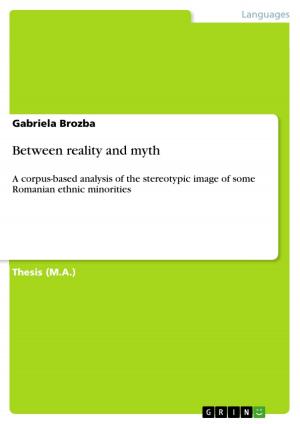Gulliver's Travels as a Political Satire
Whether, How and Why Sir Robert Walpole Is Represented in the Novel
Fiction & Literature, Literary Theory & Criticism, British| Author: | Andreas Raab | ISBN: | 9783640309429 |
| Publisher: | GRIN Publishing | Publication: | April 9, 2009 |
| Imprint: | GRIN Publishing | Language: | English |
| Author: | Andreas Raab |
| ISBN: | 9783640309429 |
| Publisher: | GRIN Publishing |
| Publication: | April 9, 2009 |
| Imprint: | GRIN Publishing |
| Language: | English |
Seminar paper from the year 2005 in the subject English - Literature, Works, grade: 1, University of Vienna, course: 18th Century Satire and Satirical Literature, language: English, abstract: In this term paper I focus on Jonathan Swift's Gulliver's Travels, first published in 1726, as a political satire, a book rich in its topics and possible interpretations. However, the novel's function as a political satire - which I exemplarily examine in this paper - is one of its most discussed and obvious ones. Thus, I have a close look at whether, why and how the politician Sir Robert Walpole, a contemporary of Jonathan Swift, is - satirically - represented in Gulliver's Travels. In order to fully grasp this issue, I start with a summary and comparison of both Jonathan Swift's and Robert Walpole's (political) backgrounds, beliefs, values and ideas, embedded in the historical context of the early 18th century. Then I continue with a discussion that mainly focuses on the following questions: Does the character Flimnap merely represent Robert Walpole or does it rather stand for politicians in general? What could have been Jonathan Swift's (political) intentions to do so? And, finally: How does satire as such then function in this case?
Seminar paper from the year 2005 in the subject English - Literature, Works, grade: 1, University of Vienna, course: 18th Century Satire and Satirical Literature, language: English, abstract: In this term paper I focus on Jonathan Swift's Gulliver's Travels, first published in 1726, as a political satire, a book rich in its topics and possible interpretations. However, the novel's function as a political satire - which I exemplarily examine in this paper - is one of its most discussed and obvious ones. Thus, I have a close look at whether, why and how the politician Sir Robert Walpole, a contemporary of Jonathan Swift, is - satirically - represented in Gulliver's Travels. In order to fully grasp this issue, I start with a summary and comparison of both Jonathan Swift's and Robert Walpole's (political) backgrounds, beliefs, values and ideas, embedded in the historical context of the early 18th century. Then I continue with a discussion that mainly focuses on the following questions: Does the character Flimnap merely represent Robert Walpole or does it rather stand for politicians in general? What could have been Jonathan Swift's (political) intentions to do so? And, finally: How does satire as such then function in this case?















